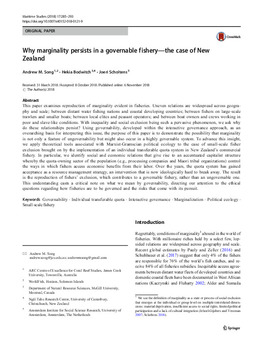Why marginality persists in a governable fishery: the case of New Zealand
Abstract
This paper examines reproduction of marginality evident in fisheries. Uneven relations are widespread across geography and scale; between distant water fishing nations and coastal developing countries; between fishers on large-scale trawlers and smaller boats; between local elites and peasant operators; and between boat owners and crews working in poor and slave-like conditions. With inequality and social exclusion being such a pervasive phenomenon, we ask why do these relationships persist? Using governability, developed within the interactive governance approach, as an overarching basis for interpreting this issue, the purpose of this paper is to demonstrate the possibility that marginality is not only a feature of ungovernability but might also occur in a highly governable system

